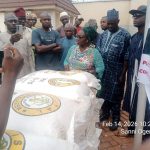Enhancement of Skills Development: TETFund Inaugurates 3 Ad Hoc Committees
The Tertiary Education Trust Fund (TETFund) has inaugurated three ad hoc committees with the task of up-scaling skills development in the country as well as strengthening the Fund’s intervention activities towards the delivery of its mandate.
The Committee includes: Committee on operationalisation of equipment upgrade in workshops and laboratories for universities, polytechnics and colleges of education (technical), chaired by Prof. Hayward Babale, Committee on assessment/review of TETFund centres of excellence, chaired by Prof. Oyewale Tomori and Committee on operationalisation of skills development special intervention, chaired by Prof. Idris Bugaje.
The Executive Secretary of TETFund, Arch. Sonny Echono, speaking at the Inauguration of the committees in Abuja on Monday, disclosed that the constitution of these Committees underscores the importance the Fund attaches to strengthening its intervention activities towards the delivery of its mandate. Bearing in mind the importance of the tasks ahead.
According to him, the Members of these Committees were carefully selected based on their individual capacities and the belief that they will collectively work as a team to deliver on these vital assignments.
Echono noted that the promotion of skills development was one of the priority area of government to address the prevailing challenges of youth unemployment and prevalence of poverty in our society.
He commended the National Board for Technical Education (NBTE) for making deliberate efforts to improve skill development in Nigerian polytechnics by formalising the informal apprenticeship training through The National Skills Qualification framework (NSOF).
He added that in accordance with the Fund’s commitment to the promotion of skills development, provision was made for skills development programme in Polytechnics under the Fund’s Special Interventions.
”In line with the Fund’s commitment to deepen its content-based interventions and facilitate the institutionalization of Research and Development, concerted efforts are being made to identify more innovative ways to enhance research capacities of our Beneficiary Institutions and promote skills development for our teeming youths.”
”Modern economic development process continues to depend on increased productivity arising from purposeful and problem-solving research.
It has been acknowledged that no society can succeed without adequate research infrastructure facilities to support innovative research for solving societal problems, Echono noted”
”The National Survey funded by the Fund in 2022 to assess the availability, functionality and compatibility of all existing research facilities across the Beneficiary Institutions, in relation to contemporary requirements and global best practices, reveals that most of the equipment in the Laboratories and Workshops of our Beneficiary Institutions are obsolete, inadequate or underutilized.”
”Notably, improving and expanding Nigeria’s R&D Infrastructure and facilities are essential if we are to raise the level of productivity and move the country to a knowledge-based economy.
Consequently, the Fund made provision under the 2024 intervention for the upgrade of the equipment in Workshops and Laboratories for Universities, Polytechnics and Colleges of Education (Technical).”
”To ensure effective implementation of the intervention, the Fund constituted an Advisory Committee chaired by Prof. Hayward Mafuyai Babale to advise on the operationalization of the upgrade of equipment in Workshops and Laboratories of the Institutions.
The Committee has the following Terms of Reference (ToR):
Assess the state of workshops and Laboratories in target Institutions (Universities, Polytechnics, Colleges of Education), this includes equipment and other facilities in use.
Determine requirements/criteria for upgrade of equipment in the workshops and Laboratories.
Make recommendations regarding type/category of upgrade, whether equipment repair or replacement of obsolete equipment, physical infrastructure improvement (renovation/reconstruction/rehabilitation) of existing workshops/Laboratories, sustainable power supply or any other necessary facility needed.
Any other recommendations that will ensure effective and efficient use of the Workshops and Laboratories in the Institutions for maximum impact including any additional support needed.
Also, the Ad Hoc Committee chaired by Prof. Oyewale Tomori to assess and review the performance and progress of the Centres in the Universities in line with their specific mandate was to assess performance of the existing TETFund Centres of Excellence hosted in universities based on their given mandates and areas of specialization.
To Identify Centres adjudged to be performing well and recommend same for additional funds for sustainability and upgrade and make recommendations regarding type/category of upgrade whether physical infrastructure improvement, provision of required Laboratory equipment/equipment repair or any other necessary facility needed.
It was also to identify the equipment, facilities and infrastructure needed for each of the selected TCoE to be upgraded taking cognizance of geographic location, surrounding environment including presence of industries, needs of the surrounding Institutions and strategic areas of focus of the TCoE for maximum impact.
Also, any other recommendations that will ensure effective and efficient achievement of strategic objectives for the upgrade and implementation of activities of the Centres including additional support needed.
The Advisory Committee chaired by Prof. Idris M. Bugaje, the Executive Secretary of NBTE to advice on the modalities for the operationalization of the Skills Development Special Intervention.
The Terms of Reference for this committee was to assess present state of Skills Development Programmes in Polytechnics based on the Entrepreneurship and Skills Development Policy of Government.
To harvest and determine Skills Development priorities of each Polytechnic based on its areas of comparative advantage and Identify needs of the institutions for 2 above in terms of facilities, equipment and capacity building, taking into cognizance that training programmes should not utilize more than 10% of the total amount allocated under the intervention for each Institution among others.
Echono said the committees were to submit their reports within six weeks from the day of their inauguration.
Responding, the Chairman, Committee on operationalisation of skills development special intervention, Prof Idris Bugaje, commended the Fund for investing in skills development.
“The three committees are very important because skills cut across all of them. In the past, polytechnics are behaving like ivory towers doing what universities are doing. This is not right, we are complimentary to universities.
“We have specific roles to play and the role is the provision of skills. We must train our own and use them,” he said.3










